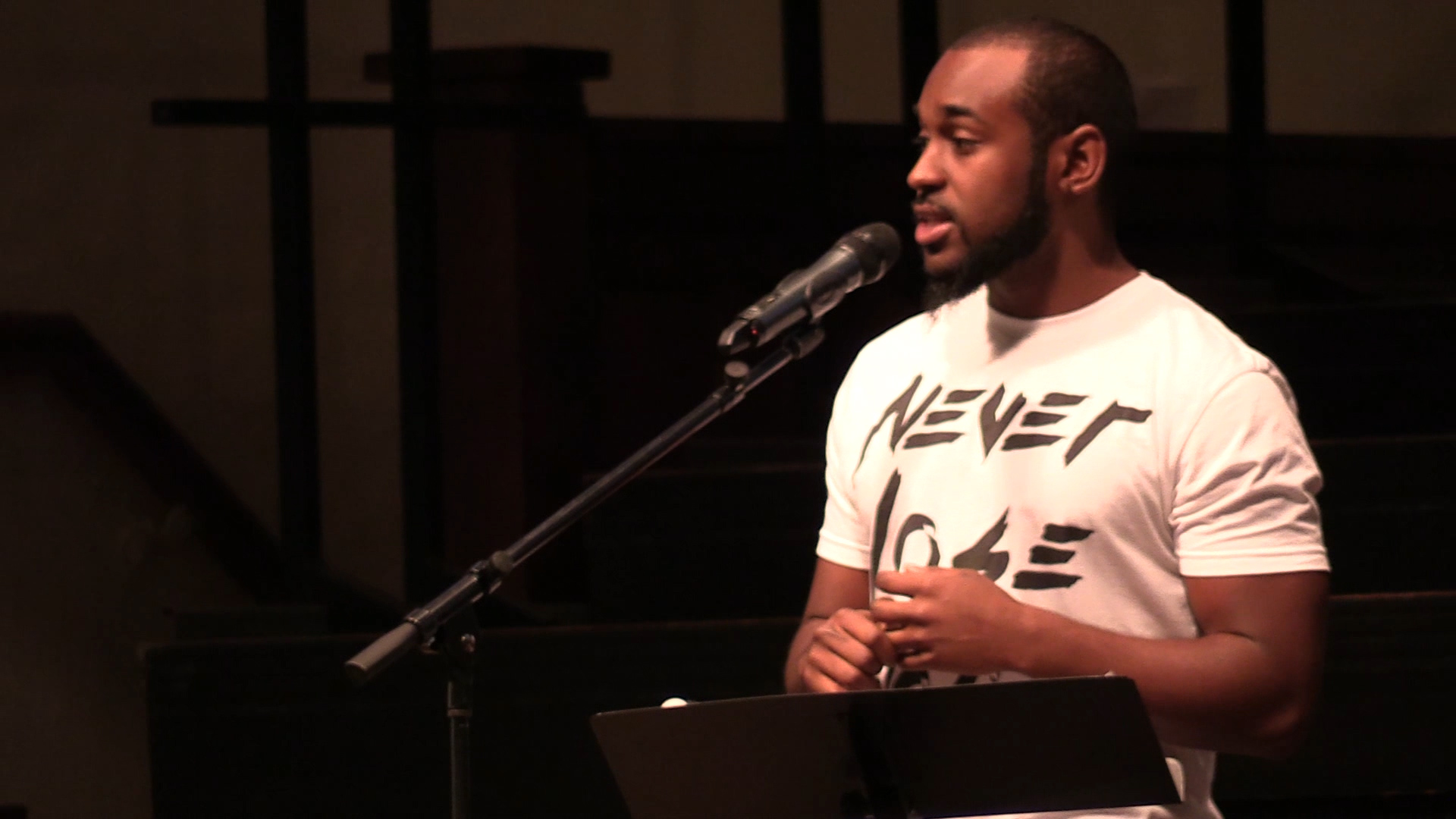By Jorge Castorena, Executive Editor
Spoken word is an art form, to be sure. But, it makes me nervous. It just always seems like it starts out on the lighter side, and then, without warning, the poetry gets real and emotions fly high and the poet’s voice grows louder and more intense as he or she makes societal commentary too deep for me to take in so quickly. Before I know it, it’s over, and I have no idea what just happened.
And yet, I was a big fan of Micah Bournes (pictured right) during his visit to campus. In truth, despite my irrational reservations about spoken word, I almost wish he had shared more of it during chapel if that didn’t mean his remarks would have been shorter. After the service, I did not miss the first opportunity I had to say to a group of people “I love y’all, forreal,” but more importantly, I thought about racism all day.
While on the subject of spoken words, I’m not a big fan of the word “race,” because I am of the opinion that there is just one human race, and there are many ethnicities, and perhaps as a society we should revisit how we define and talk about “race.” Such a vocabulary change alone already adds an element of unity to the ever-so-charged discussion on race. One race. Many ethnicities.
But, I digress. Bournes brought up a profound and simple point: because, and perhaps naturally, we struggle to see past our own cultural lenses, we often ignore the ethnic other and his or her perspective. We are quick to dismiss, quick to presume, quick to judge — the way I do with spoken word. In doing so, we ignore the beauty and diversity of God’s creation, and we never once consider that He has called us to be one with each other.
In a sermon by Dr. Martin Luther King Jr. titled “A Tough Mind and a Tender Heart,” King explains that the reason we judge so quickly is because we are soft- minded. A tough mind, he said, is “sharp and penetrating, breaking through the crust of legends and myths and sifting the true from the false.” A soft mind, then, is dull and withdrawn, satisfied with legends and myths and not discerning between truth and falsehood.
We are a soft-minded people. It is true that we are flooded with information, often-misconstrued facts by people with biased agendas who present their opinions to us in tempting ways. But, as Dr. King asserts, we are gullible. So, we develop stereotypes and prejudge and before we know it we are participants in a system that devalues humanity and its rich, God-given diversity.
I will never forget the time I realized I was racist. It was early in the morning some four years ago and the television was on as I mindlessly listened to the morning news. At this point, I was listening to the television, not watching, and the anchor began talking about a robbery that occurred the night before. Remorsefully and apologetically, I have to share that as they talked about the suspect, I had the outrageous thought I bet he’s black without truly thinking of the obscenity of that notion. I looked up because I knew they would flash the mug shot of the suspect and I ashamedly admit my surprise when I saw it: he was white.
In that instant, I was horrified at myself and what I had just done: I took the ethnicity of millions and defined it by a single, isolated event on the news. I wasn’t thinking, and that’s the problem.
Unfortunately, we associate crime with black neighborhoods and black suspects. By the time we are 18, we have seen way too many mug shots of “black males,” far more than Mexican or Asian or White mug shots. And I realized in that moment how thoughtless I was about ethnic issues. I was convicted of my soft-mindedness. I let media images shape my worldview. I was quick to dismiss, quick to presume, quick to judge.
We’ve all done it. To black people, white people, Arabs, Asians, Mexicans, and immigrants.
And to think, I’m Mexican; I should have been more aware of ethnic issues. But I grew up in predominantly (which perhaps might be an understatement) white neighborhoods and I was in predominantly white classrooms. Most of my friends were white. Likewise, my pastors have always been white. As much as I am a child of Mexican parents, I am a child of white-American culture. These are my lenses, and though they don’t justify what happened, they help explain the incident of that morning long ago and help define the instincts with which I interact with the world.
Still, none of that is an excuse to not choose to think differently. We can choose to widen our lenses. I can choose to cultivate within myself a tough-mind. We can’t just look at a president or lawmaker, movies or the media, to fix it. It starts with individuals thinking more, because that quickly grows into a movement, and then those in power are forced to listen.
Above all things, we can choose to put ourselves in the ethnic other’s shoes and learn from the new perspective, toughening our minds. Micah Bournes is right: in doing so, we may just catch a glimpse of the big picture — of oneness in celebration of diversity and God’s imagination — and then change the world.


